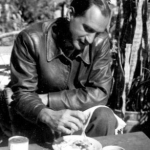When this warm scribe, my hand, is in the grave.
—John Keats
1.
You are here
on the underside of the page,
writing in water,
anachronist,
showing your head
with its delicate fuses,
its fatal telemetry,
a moundful of triggers and gunpowder
like a field-mine,
your sixty-one inches
and your gem-cutter’s fingers,
anonymous,
taking the weight
of a “roomful of people”
but making no mark,
pressing the page as I write,
while the traffic in Rome,
demotic with engines and klaxons,
circles the Pyramid of Cestius,
crosses a graveyard, and submerges
again like the fin of a shark.
2.
I write, in the posthumous way,
on the flat of a headstone
with a quarrier’s ink, like yourself:
an anthologist’s date and an asterisk,
a parenthetical mark in the gas
of the pyramid-builders,
an obelisk whirling with Vespas
in a poisonous motorcade.
I make your surgeon’s incision for
solitude—one living hand, two
poets strangled in seawater and phlegm,
an incestuous
ego to reach for
the heart in the funeral ashes,
a deathbed with friends.
3.
Something murderous flows
from the page to my hand—
a silence that wars
with the letters, a fist
that closes on paper: a blow
with the straight edge of a razor
that falls with a madman’s
monotony; or the adze
of a sleepwalking Sumerian
nicking the wet of the clay,
hacking a wedge in a tablet
in the blood and the mica,
till all glistens with language.
The criminal folds up his claspknife. The shutters
slam down on the streets. Nobody listens.
4.
Out of breath with the climb, and
tasting a hashish of blood,
what did he see on the brink
of the Piazza di Spagna? A hand
in the frame of a cithara
where beggars and sunbathers
clotted the levels like musical
signatures, a Wordsworthian
dream of “degree,” “unimaginable
time” touched by an axe
blade—or a pram
on the Steps of Odessa
torn from the hands of
its mother, gathering speed for the
plunge and rocking its tires
in the rifling, like a gun barrel,
smashing its way through the Tzar’s
executioners, to a scream at the bottom?
5.
A failed solitude ... The bees
in the Protestant grass
speak of it delicately
in the sweat of a
Palatine summer, guiding my hand
through the Braille of the letters.
Violet, bluet, or squill—
what was it I picked
under the epitaph, what
rose to my touch
in the thirst of the marble, a cup
from the well of your grave
in the noonday miasma,
a hieroglyph in the water, saying:
solitude, solitude, solitude:
you have it at last—your
solitude writing on water,
alone with its failure.
6.
You are there
on the underside of the page,
a blue flower in my Baedeker,
writing on water. I know it.
The paper pulls under my pen
peaks into waves
running strongly into the horizon.
The emptiness hardens
with balustrades, risers, and levels,
a staircase of Roman
azaleas. I slip on the blood and the ink
toward the exigent bed
of a poet. All is precarious. A maniac
waits on the streets. Nobody listens. What
must I do? I am writing on water,
blazing with failures, ascending,
descending among lovers and trippers.
You are pressing me hard
under the paper. At Santa Trinità dei Monti
the stairway parts like an
estuary, rises and falls like a fountain.
There is nothing to see but a death-mask, your
room in an island of risers and treads, oddly
gregarious, an invisible hand in the granite.
7.
The tidal salts drain on a living horizon,
leaving a glare on the blemishing
paper. The silence is mortal.
Nobody answers.
for Joan Hutton Landis



















Comment form: